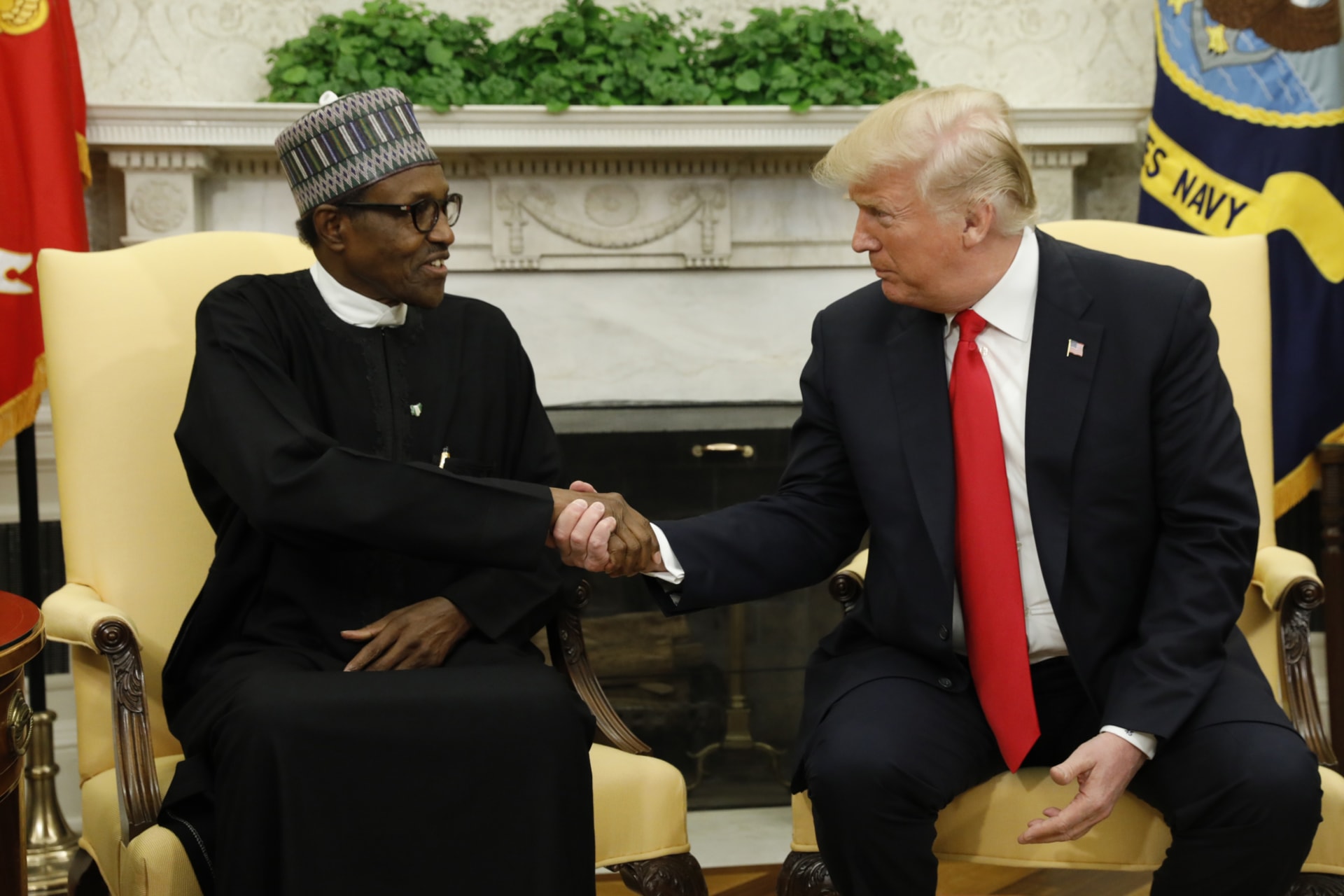Buhari’s Visit to Washington a Small Win for President Trump

By experts and staff
- Published
By
- John CampbellRalph Bunche Senior Fellow for Africa Policy Studies
President Donald Trump should be very happy with Nigerian President Muhammadu Buhari. Unlike the recent visits of French President Emmanuel Macron, who criticized Trump’s policies before a joint session of Congress, or German Chancellor Angela Merkel, who continues to be critical of a range of Trump’s polices, Buhari praised Trump in ways that will be pleasing to him and his base.
Based on media coverage of the Nigerian president’s April 30 meeting with President Trump and a transcript of their press conference together, Buhari said a number of things in Trump’s favor:
- He elegantly side-stepped the insulting references by President Trump about the African continent earlier in his administration, taking the issue off the table (even though Trump put it back on the table).
- He praised President Trump for progress toward removing nuclear weapons from the Korean peninsula: “President Trump deserves a great deal of credit for his statesmanly role in transforming so dramatically the cause [sic] of events in that region.”
- He congratulated President Trump for “the impressive performance of the of the United States economy on his watch.”
- He congratulated “the United States government” and, by implication, President Trump, on its leading role in the defeat of the Islamic State and for enhanced bilateral U.S.-Nigeria security cooperation.
- He thanked the administration for its assistance in recovering stolen Nigerian funds.
The Buhari visit also provided a venue for President Trump to appeal to his own political base:
- He affirmed Nigeria’s leadership role in Africa and his support for the Buhari administration’s fight against terrorism.
- He focused on the killing of Christians by Islamist groups in Nigeria: “we are deeply concerned by religious violence in Nigeria, including the burning of churches, and the killing and persecution of Christians. We encourage Nigeria and the federal, state, and local leaders to do everything in their power to immediately secure the affected communities and to protect innocent civilians of all faiths, including Muslims and including Christians.”
- He called on Nigeria to reduce trade barriers, and linked them to corruption. (He returned to that theme several times during the joint press conference.)
- He tied “jihadist terrorism” to human trafficking, and also to his calls for U.S. immigration reform and a construction of a wall on the Mexican border.
As President Buhari observed, security cooperation is limited. However, the day before the two presidents met, a senior special assistant to President Buhari, Malam Garba Shehu, said that President Barack Obama had failed to provide the support Nigeria needed for the fight against terrorism, likely referencing Obama’s decision to block the sale of Super Tucanos to Nigeria on human rights grounds. Trump, during the press conference, explained how he had unblocked the sale. Garba Shehu went on to say that, under President Trump, U.S.-Nigeria relations “had recorded remarkable progress.”
Among other things, Buhari’s visit may have at least partly defanged criticism of Trump that he is racist vis-à-vis his alleged derogatory remarks about Africa. However, the Buhari visit is likely to have only a limited impact on American domestic politics in the run-up to the mid-terms in November. For Buhari, the trip was a win in ways that are more concrete. President Trump reaffirmed Nigeria’s regional leadership role, promised security cooperation, and promised that the attorneys general of the two countries are looking for ways to return stolen Nigerian funds, estimated at $500 million, parked in the United States.
His business supporters will be pleased that he raised the issue of trade barriers. As he regularly criticizes his presidential predecessor, President Trump is also likely to be pleased by Garba Shehu’s criticism of President Barack Obama.
President Trump’s evangelical supporters also will likely be pleased that he raised explicitly the killing of Christians. So, too, was a Nigerian separatist group. According to Nigerian media, a spokesman for the Indigenous People of Biafra congratulated “the people of America and president Donald J. Trump for openly condemning the barbaric killings of Christians in Nigeria by the…government led by Major General Muhammed Buhari.” He went on to say, “President Donald Trump is a God sent to ameliorate the suffering of Christians in Nigeria.” (Nigerian spokespersons often delight in inflated English.)